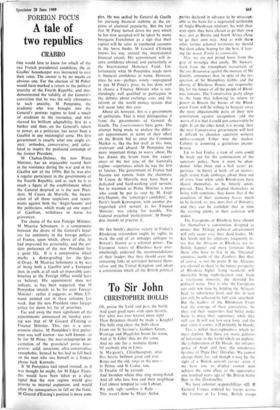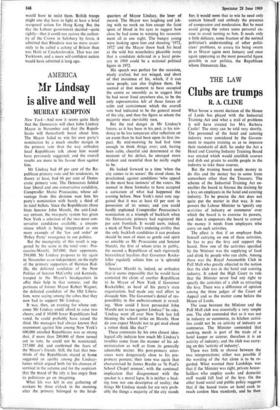A tale of two republics
FOREIGN FOCUS CRABRO
One would love to know for which of the two French presidential candidates the de Gaulles' housekeeper was instructed to cast their votes. The answer is by no means an obvious one. For the election of M Poher would have marked a return to the political anarchy of the Fourth Republic, and thus demonstrated the validity of the General's conviction that he was the only alternative to such anarchy. M Pompidou, the academic who was brought into the General's postwar regime to lend a touch of erudition to the resistance, and who showed his brilliant adaptability first as a banker and then, on the General's return to power, as a politician, has never been a Gaullist in any meaningful sense. His first government is exactly what one might ex- pect: orthodox, conservative, and calcu- lated to inspire the profound contempt of the former President.
M Chaban-Delmas, the new Prime Minister, has an impeccable record both in the resistance during the war and in the Gaullist RPF of the 1950s. But he was also a regular participant in the governments of the Fourth Republic, and as such he is as much a figure of the establishment which the General despised as is the new Presi- dent. M Couve de Murville, the incarn- ation of all those suspicions and resent- ments against both the 'Anglo-Saxons' and the politicians, which made up one aspect of Gaullism, withdraws to nurse his grievances.
The choice of the new Foreign Minister, M Maurice Schumann, is a compromise between the desire of the General's loyal- ists for continuity in the foreign policies of France, upon which, above all else, he had impressed his personality, and the evi- dent preference of the new President for a quiet life. It is a compromise which marks a down-grading for the Quai d/Orsay. M Maurice Schumann is by way of being both a Gaullist and a European (not, in truth, at all such an impossible com- bination as the Foreign Office would have us believe). His appointment does not indicate, as has been suggested, that M Pompidou intends to be his own Foreign Minister: rather it suggests, as Marc Ull- mann pointed out in these columns last week, that the new President rates foreign policy far down his list of priorities.
Far and away the most significant of the appointments announced on Sunday even- ing was that of M Giscard d'Estaing as Finance Minister. This, too, is a com- promise choice. M Pompidou's first prefer- ence was well known—too well known—to be for M Pinay, the near-octogenarian in- carnation of the provincial petite bour- geoisie; solid, tenacious, ultra-conservative. xenophobic. Instead he has had to fall back on the man who sees himself as a franco- phone Jack Kennedy.
If M Pompidou had opted instead, as it was thought he might, for M Edgar Faure, this would have been taken as a clear signal that the new regime would give priority to internal expansion, and would allow the consequences to fall on the franc. M Giscard d'Estaing's position is more corn-
plex. He was sacked by General de Gaulle for pursuing financial stability at the ex- pense of electoral popularity. But the fact that M Pinay turned down the post which he has now accepted will be taken by many bourgeois Frenchmen as a sign that their capital will be safer in numbered accounts in the Swiss banks. M Giscard d'Estaing knows his way around the international financial circuit. His appointment will in- spire confidence abroad, and particularly at the International Monetary Fund. Un- fortunately what M Pompidou needs most is financial confidence at home. However, since he was—perhaps wisely—unprepared to pay M Pinay's price, he has done well to choose a Finance Minister who is out- standingly well qualified to participate in the debates about exchange rates and the reform of the world money system that will occur later this year.
Above all, however, this is a government of politicians. That is what distinguishes it from the governments of General de Gaulle. The fonctiotmaires have gone. The attempt being made to analyse the differ- ent appointments in terms of their effect on the British bid to enter the Common Market is, like the bid itself at this time, irrelevant and absurd. M Pompidou has more important things to worry about. He has drawn the lesson from the experi- ences of the last year of the General's regime—experiences which he was the first to foresee. The government of France had become too remote from the electorate. M Couve de Murville may have been a dedicated and hard-working civil servant; but to maintain as Prime Minister a man who could be put to rout by M. Fred- eric-Dupont, the 'concierge's candidate', in Paris's South Kensington, with another dis- tinguished civil servant as his Finance Minister, was asking for trouble. The General preached 'participation'. M Pompi- dou intends to practice it.
Mr Ian Smith's decisive victory in Friday's Rhodesian referendum ought, by rights, to mark the end of an unhappy epilogue to Britain's history as a colonial power. The European voters of Rhodesia have over- whelmingly endorsed the recommendations of their leaders that they should sever the remaining links of sentiment between them- selves and the United Kingdom and adopt a constitution which all the British political parties declared in advance to be unaccept- able as the basis for a negotiated settlement of Anglo-Rhodesian relations. So, with their eyes open, they have chosen to go their own
way, just as Burma and South Africa chose to go their own way. And as with these other former colonial territories we should bid them adieu, hoping for the best, if fear- ing the worst, Finitti la conunetlia.
Alas, we are not prised loose from the grip of nostalgia that easily. Mr Stewart, fresh from the triumphant reassertion of the pax Britannica against the menace of Mr Gurnbs, announces that, in spite of the res- ignation of Sir Humphrey Gibbs and the closing of Rhodesia House, our responsibi- lity for the future of all the people of Rhod- esia remains. The Conservative party clings to the hope that following its return to power in Britain the bosses of the Rhod- esian Front will be willing to bargain away the more objectionable parts of their new constitution against recognition--and the worst of it is that it could just conceivably be right. If, on the other hand, it is wrong, then the next Conservative government will find it difficult to abandon sanctions without embarrassment. Either way the shadow Cabinet is assuming a gratuitous encum- bUp to last Friday a case of sorts could be made out for the continuation of the sanctions policy. Now it must be aban- doned. After three and a half years' ex- perience—in theory at least—of an increas- ingly severe trade embargo, about three out of every four white adult Rhodesians have shown themselves to be bitterly unim- pressed. They have adapted themselves to living with sanctions; they know that if the condition of their economy leaves much to be desired, so, too, does that of Britain's; and they can be confident that in time the existing chinks in their isolation will widen.
The Europeans of Rhodesia have chosen for themselves a constitution designed to ensure that African political advancement will only occur over their dead bodies. Mr Ian Smith and his adjutants frequently in- sist that the Africans in Rhodesia are in- finitely happier and more fortunate than those who have to live in the 'liberated' countries north of the Zambesi. But that, of course. is not the point. If the Africans are allowed to share in the future prosperity of Rhodesia higher living standards will inevitably bring sophistication and, from a vociferous minority, the demand for political status. That is why the Europeans can only win time by holding the Africans back to subsistence level, and this in turn can only be achieved by full-scale apartheid. But the leaders of the Rhodesian Front lack the courage of their convictions. So they and their supporters had better make haste to enjoy their supremacy while they still can. It will not last very long, and the
end. when it comes, will probably be bloody. This is wilful short-sightedness which we must deplore. But there are many patterns
of behaviour in the world which we deplore: the collaboration of Dr Husak; the intransi- gence of Arab and Jew; the murderous tyranny of 'Papa Doc' Duvalier. We cannot change them, for, sad though it may be, the sight of a British aircraft carrier—even if we have one to display--cannot now achieve the same effect as the appearance one hundred years ago of the British battle fleet in the Dardanelles.
We have colonial responsibilities still. If General Franco ordered his troops across the frontier at La Linea, British troops would have to resist them. British troops might one day have to fight at least a brief rearguard action for Hong Kong. But the day the Labour government decided—quite rightly—that it could not restore the author- ity of the Crown in Salisbury by force, it admitted that Rhodesia was no more accur- ately to be called a colony of Britain than was Haiti or Czechoslovakia. That was our Yorktown, and a more self-confident nation would have admitted it long ago.



































 Previous page
Previous page